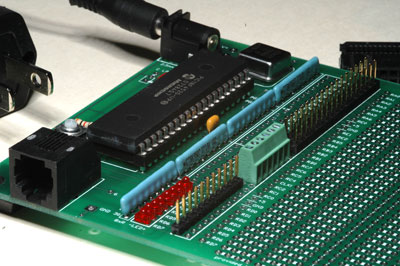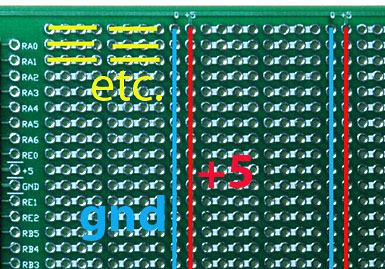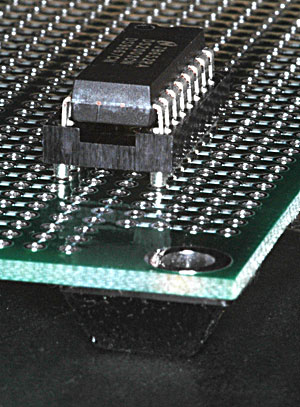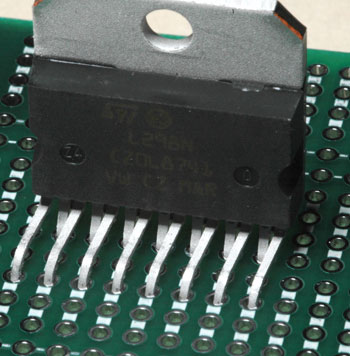Difference between revisions of "4520 Board use"
| (6 intermediate revisions by the same user not shown) | |||
| Line 1: | Line 1: | ||
[[Image:4520-small.jpg|right]] |
[[Image:4520-small.jpg|right]] |
||
| ⚫ | |||
<b>Using the 4520 board</b> |
<b>Using the 4520 board</b> |
||
The 4520 board is intended to allow several kinds of connectors on 0.1" centers. Shown at right |
The 4520 board is intended to allow several kinds of connectors on 0.1" centers. Shown at right are a single-line header, which, if mounted underside could be plugged into a solderless breadboard. You also see a terminal strip for attaching wires, and a double-row header that mates to a ribbon cable connector, which could efficiently bring many PIC pins to another board. Ribbon cable connectors up to 50-wide are available. |
||
[http://hades.mech.northwestern.edu/wiki/images/b/bd/4520-big.jpg Larger picture] |
|||
[[Image:4520-lines.jpg|right]] |
|||
[[Image:4520-pattern.jpg|right]] |
[[Image:4520-pattern.jpg|right]] |
||
| ⚫ | |||
<b>Connection pattern</b> |
|||
| ⚫ | |||
[http://hades.mech.northwestern.edu/wiki/images/3/32/4520-lines.jpg Larger picture] |
|||
| ⚫ | |||
<b>Chips in sockets</b> |
|||
The rest of the connection points are connected only in groups of 4. It's intended that chip sockets span between two groups of 4, across the +5 and ground rails. Whenever possible socket your components. |
The rest of the connection points are connected only in groups of 4. It's intended that chip sockets span between two groups of 4, across the +5 and ground rails. Whenever possible socket your components. |
||
[[Image:4520-298n.jpg|right]] |
[[Image:4520-298n.jpg|right]] |
||
<b>Other components</b> |
|||
We don't have sockets for the popular L298N H-bridges. They can be soldered between adjacent groups of 4, by displacing one row of leads 0.05". |
We don't have sockets for the popular L298N H-bridges. They can be soldered between adjacent groups of 4, by displacing one row of leads 0.05". |
||
Latest revision as of 00:34, 27 December 2007
Using the 4520 board
The 4520 board is intended to allow several kinds of connectors on 0.1" centers. Shown at right are a single-line header, which, if mounted underside could be plugged into a solderless breadboard. You also see a terminal strip for attaching wires, and a double-row header that mates to a ribbon cable connector, which could efficiently bring many PIC pins to another board. Ribbon cable connectors up to 50-wide are available.
Connection pattern
The +5 and Ground of the PIC, from the barrel connector and off-board power supply (and regulator if installed), are brought to common "rails" as shown in red and blue here.
Chips in sockets
The rest of the connection points are connected only in groups of 4. It's intended that chip sockets span between two groups of 4, across the +5 and ground rails. Whenever possible socket your components.
Other components
We don't have sockets for the popular L298N H-bridges. They can be soldered between adjacent groups of 4, by displacing one row of leads 0.05".



